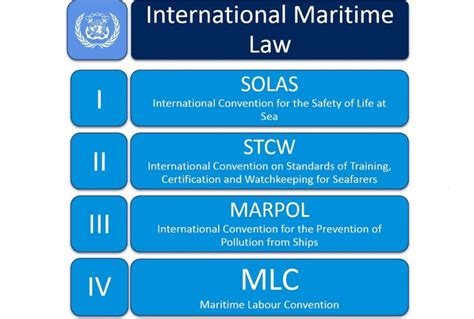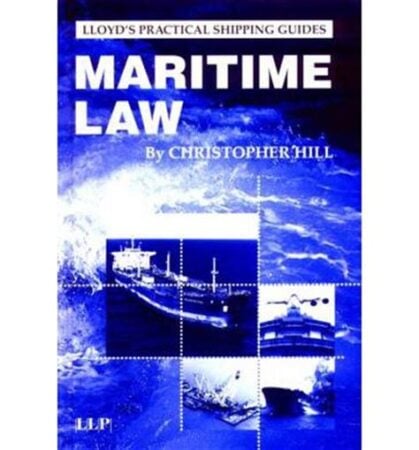
- Image: International Maritime Law Conventions and Regulations
- Introduction
- Conventions and Regulations: An Overview
- International Cooperation and Enforcement
- Maritime Tables: A Comprehensive Breakdown
- Conclusion
-
FAQ about International Maritime Law Conventions and Regulations
- What is international maritime law?
- What are some key international maritime law conventions?
- What is the role of the IMO?
- What are the types of sanctions for maritime law violations?
- How is maritime law enforced?
- What are the key principles of maritime law?
- How are disputes under maritime law resolved?
- What are the challenges facing international maritime law?
- Why is international maritime law important?
- How can I stay updated on the latest maritime law developments?
Image: International Maritime Law Conventions and Regulations

Introduction
Readers, welcome to the vast and intricate world of international maritime law conventions and regulations. Whether you’re a seasoned sailor, a legal enthusiast, or simply curious about the rules that govern the high seas, this article will take you on a comprehensive journey through these essential frameworks.
International maritime law serves as the backbone of global shipping, ensuring the safety of vessels, protecting the marine environment, and upholding the rights and responsibilities of seafarers. Conventions and regulations adopted by the International Maritime Organization (IMO) and other international bodies provide a framework for harmonizing maritime practices and fostering cooperation among nations.
Conventions and Regulations: An Overview
SOLAS and Maritime Safety
The International Convention for the Safety of Life at Sea (SOLAS) is a cornerstone of maritime safety. It sets minimum standards for ship design, equipment, and emergency procedures. SOLAS aims to prevent maritime disasters and ensure the safety of passengers, crew, and vessels.
MARPOL: Protecting the Marine Environment
The International Convention for the Prevention of Pollution from Ships (MARPOL) addresses the critical issue of marine pollution. It prohibits the discharge of harmful substances into the sea, including oil, chemicals, and sewage. MARPOL also promotes innovative technologies for waste management and pollution prevention.
MLC and Seafarers’ Rights
The Maritime Labour Convention (MLC) establishes international standards for the treatment of seafarers. It covers working conditions, wages, hours of work, and welfare facilities. The MLC ensures that seafarers are treated with dignity and respect, and their rights are protected.
International Cooperation and Enforcement
IMO and Global Governance
The International Maritime Organization (IMO) is the leading authority on international maritime law. It develops conventions, regulations, and guidelines to promote maritime safety, environmental protection, and the welfare of seafarers. IMO brings together governments, industry stakeholders, and international organizations to address global maritime challenges.
Enforcement and Compliance
Enforcing international maritime law conventions and regulations is crucial for their effectiveness. Countries have the responsibility to implement these frameworks into their domestic laws and ensure compliance. Flag states, coastal states, and port authorities play a vital role in monitoring vessels, conducting inspections, and enforcing regulations.
Maritime Tables: A Comprehensive Breakdown
| Convention/Regulation | Purpose | Key Provisions |
|---|---|---|
| SOLAS | Enhance maritime safety | Ship construction, lifesaving equipment, fire protection, navigation |
| MARPOL | Prevent marine pollution | Discharge limits, waste management, pollution response |
| MLC | Protect seafarers’ rights | Working conditions, wages, hours of work, welfare |
| STCW | Ensure seafarer competence | Training, certification, watchkeeping standards |
| ISM Code | Improve ship management | Safety management system, operational procedures |
| ISPS Code | Enhance port security | Ship and port security assessments, access control |
Conclusion
Readers, this comprehensive guide has provided you with a solid understanding of international maritime law conventions and regulations. These frameworks are essential for safeguarding human life at sea, protecting the environment, and upholding the rights of seafarers. As you explore the vast expanse of maritime law further, we encourage you to check out our other articles for even more insights and perspectives.
FAQ about International Maritime Law Conventions and Regulations
What is international maritime law?
International maritime law encompasses the legal framework governing the maritime industry’s international aspects, including shipping, navigation, marine environment protection, and dispute resolution.
What are some key international maritime law conventions?
- IMO Convention: International Maritime Organization’s (IMO) foundational convention, establishing its structure and functions.
- SOLAS Convention: International Convention for the Safety of Life at Sea, setting safety standards for ships and passenger protection.
- MARPOL Convention: International Convention for the Prevention of Pollution from Ships, regulating waste and pollution discharges from vessels.
What is the role of the IMO?
The IMO is the primary international organization responsible for regulating and coordinating maritime affairs. It facilitates cooperation among member states and develops binding and non-binding conventions and regulations.
What are the types of sanctions for maritime law violations?
Violations of maritime law can result in various sanctions, including:
- Fines and penalties
- Suspension or revocation of licenses
- Detention of ships
- Criminal prosecution
How is maritime law enforced?
Maritime law is enforced through national and international authorities, including coast guards, maritime police, and environmental protection agencies. Additionally, international organizations like the IMO provide guidance and support for enforcement.
What are the key principles of maritime law?
- Safety of navigation and ship passengers
- Protection of the marine environment
- Prevention and suppression of maritime crime
- Equitable and fair treatment of seafarers
How are disputes under maritime law resolved?
Maritime disputes can be resolved through various mechanisms, such as:
- Arbitration through the London Maritime Arbitrators Association (LMAA)
- Adjudication by national courts
- Settlement through diplomatic channels
What are the challenges facing international maritime law?
- Enforcing regulations across different jurisdictions
- Addressing emerging environmental issues
- Keeping pace with technological advancements in shipping
Why is international maritime law important?
International maritime law ensures the safe, secure, and environmentally sustainable operation of the global maritime industry, which is vital for international trade and global connectivity.
How can I stay updated on the latest maritime law developments?
- Consult the IMO website and relevant national maritime authorities
- Attend industry conferences and webinars
- Subscribe to maritime law-related publications




